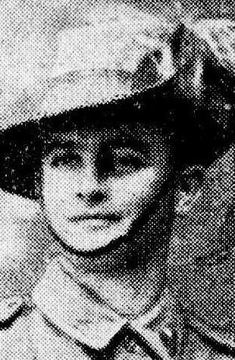
EGGINS, Harold James
| Service Number: | 387 |
|---|---|
| Enlisted: | 28 October 1914, Grafton, New South Wales |
| Last Rank: | Corporal |
| Last Unit: | 5th Light Horse Regiment |
| Born: | Grafton, New South Wales, 1892 |
| Home Town: | Ulmarra, Clarence Valley, New South Wales |
| Schooling: | Not yet discovered |
| Occupation: | Plumber |
| Died: | Killed in Action, Gallipoli, Gallipoli, Dardanelles, Turkey, 28 June 1915 |
| Cemetery: |
Shell Green Cemetery, Gallipoli Peninsula II K 16, Shell Green Cemetery, Gallipoli Peninsula, Canakkale Province, Turkey |
| Memorials: | Australian War Memorial Roll of Honour, Ulmarra Public School WW1 Roll of Honour |
World War 1 Service
| 28 Oct 1914: | Enlisted AIF WW1, Corporal, 387, 5th Light Horse Regiment, Grafton, New South Wales | |
|---|---|---|
| 21 Dec 1914: | Involvement AIF WW1, Corporal, 387, 5th Light Horse Regiment, Enlistment/Embarkation WW1, --- :embarkation_roll: roll_number: '2' embarkation_place: Sydney embarkation_ship: HMAT Persic embarkation_ship_number: A34 public_note: '' | |
| 21 Dec 1914: | Embarked AIF WW1, Corporal, 387, 5th Light Horse Regiment, HMAT Persic, Sydney | |
| 28 Jun 1915: | Involvement AIF WW1, Corporal, 387, 5th Light Horse Regiment, ANZAC / Gallipoli, --- :awm_ww1_roll_of_honour_import: awm_service_number: 387 awm_unit: 5th Australian Light Horse Regiment awm_rank: Corporal awm_died_date: 1915-06-28 |
Help us honour Harold James Eggins's service by contributing information, stories, and images so that they can be preserved for future generations.
Add my storyBiography contributed by Faithe Jones
Son of Caleb EGGINS
Of Ulmarra, Clarence River, NSW
LATE CORPORAL H. J. EGGINS.
Miss P. Eggins, of Ulmarra, and sister of the late Corporal Harold Eggins, this week received a lengthy letter from Trooper Wm. Paul, late of Glenreagh, explaining in detail the circumstances leading up to death of the brave soldier, who was the first Ulmarraite to lay down his life at Gallipoli. He writes, amongst other things: "I am certain you have not received my letter regarding how my best friend, your brother Harold, received his death wounds. I wrote a full account of that awful day, June 28th, giving you the details of everything, but it was not allowed to pass the censor, I being instructed to not write a detailed account of such happenings I am now giving you the details, as I think they will reach you on this occasion. We went out from our trenches about 1.30 p.m.. as supports to the advance party who were to take possession of a certain portion of a hill on our right. I was just about 50 yards ahead of Harold's troop. He seemed in good spirits and very anxious to be in the fight. I was talk ing to him just before we went out, and he told me he would not miss it for the world. We got possession of our objective and they were wanting the supports, who were still coming along under the ridge. The troop Harold was in took up their position on our left. By the time the enemy got our range they were shelling us like fury. The shrapnel was bursting overhead and sprinkling their nasty leaden pellets all about us. At about 2.30 a piece of shell struck Harold's haversack, and also his leg, causing such a nasty wound, so bad that he had to have his leg amputated above the thigh. I did not see him when it happened. He was at once removes the top-dressing station where the amputation was effected. We got orders to re tire about 3.30; and when I got back to our lines I was told about Harold’s wound. I at once got permission to go and see him, and when I got there they were removing him to the rear dressing station. He was distressed a little, but called out to me as he saw me. It was then about 4.30. I gave him several small drinks. He knew his fight was nearly over, and told me so. The doctor had given him morphia to ease the pain. He inquired as to how the battle was going and spoke a little about his wound, being sure he would not recover. Yet he did not fear death. He was quiet for about five minutes. Then he said: ‘Billy, tell them at home, I did my little bit; say good-bye to them all for me.' He spoke, quietly and was holding on to my hand all the time. Then he sat up, looked around and laid down for awhile and then said 'Oh, mother.' In a minute he was quite dead; passing away with a smile on his face,
squeezing my hand tightly. No doubt he was thinking of those at home at the last. He was the bravest lad I ever saw wounded, and died as only the very bravest can die. My God I hope I shall never see so brave a lad die again. I nevpr felt so sorry, and yet so help less in my life. You cannot understand how we all felt of his death, as he was so popular with all. His death was felt more through-out the regiment than that of any N.C.O.or man we have lost. His belongings were handed into the orderly room and arrangements had been made for their despatch to his parents.” He further mentions that the soldier's grave had been done up. He had several photos taken and copies were to be sent later. One of these was taken by G. Williams, of Grafton. Details were also given of the burial, etc.












